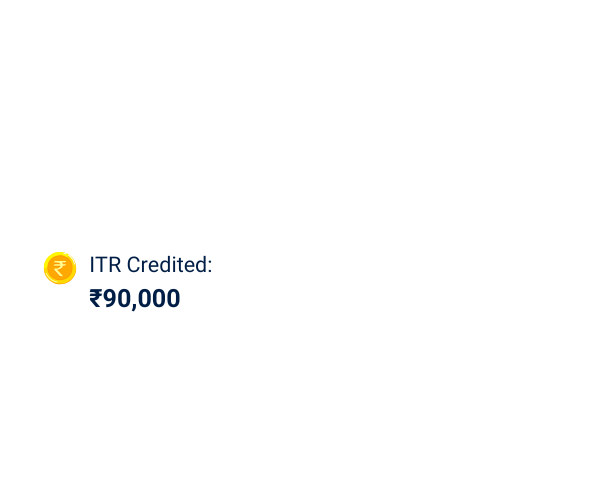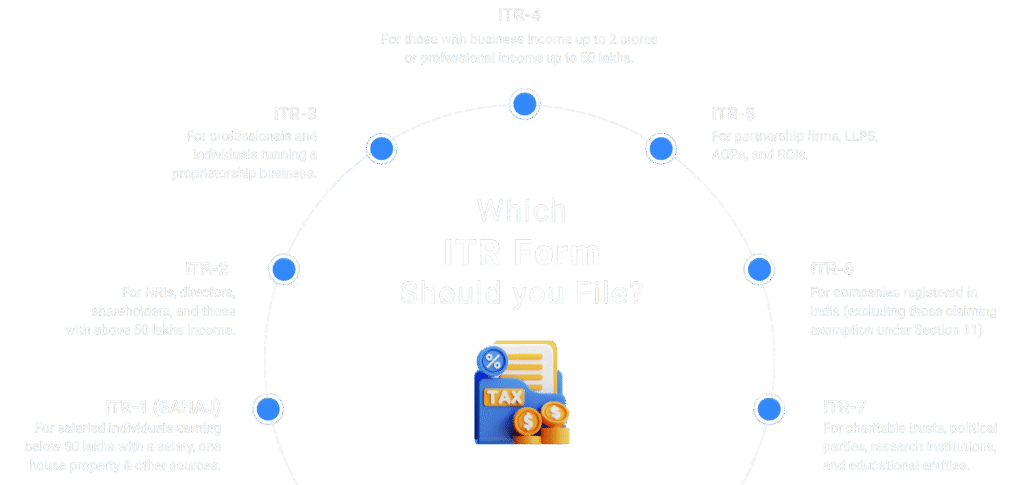Welcome to Income Tax Returns Season ’25
Get Maximum Refund
with Zero Hassle!
We will get back to you.








Secure Filing

Quick Turnaround

Filed by Professionals

100% Accuracy
File your IT Return in 3 steps
Submit Documents
Share required documents like Form 16,
bank statements, investment proofs, etc
Know Your Refund
Get an estimate of your refund based on both
the old and new tax regimes.
Get Your ITR Filed
We prepare and file your return. Get your
acknowledgment number quickly.
File your IT Return in 3 steps
Step-1
Expert Consultation
Talk to a tax expert to understand your filing needs and eligibility.
Step-2
Submit Documents
Share required documents like Form 16, bank statements, etc
Step-3
Get Your ITR Filed
We prepare and file your return. Get your acknowledgment number quickly.
The Income Tax Act (1961)
This act provides the framework
for levying, collecting, and
administering income tax in India.


Advantages of Income Tax Returns (ITR) Filing

Get back any excess TDS or advance tax paid by filing your return.

ITR acts as proof of income for loans and credit cards.

Many embassies require ITRs for the last 2–3 years during visa.

Avoid penalties under Section 234F by filing your return on time.
In India?

Salaried Individuals
If your total annual income exceeds the basic exemption limit, you are required to file IT returns online.

Self-Employed Professionals
Freelancers, consultants, and other professionals must e-file if income exceeds the threshold. Business-related deductions are allowed.

Business Owners (including SMEs & MSMEs)
All business types (sole proprietors, partnerships, LLPs, Pvt Ltd) must file ITR annually, regardless of profit or loss.

Directors and Partners
Mandatory for directors in Pvt Ltd companies and partners in LLPs to declare their income share.

Dividend, Interest, and Capital Gains Earners
Income from dividends, FDs, stocks, crypto, mutual funds, etc., must be reported.

NRIs and RNORs
NRIs with Indian income above the limit must file. RNORs may need to file based on foreign assets/income.

Foreign Asset/Income Holders
Indian residents with foreign assets or income must file, even if income is below the exemption limit.

High-Value Transactions
ITR filing is mandatory if you: Deposit ₹1+ crore in a bank, Spend ₹2+ lakh on foreign travel, Pay ₹1+ lakh in electricity bills annually

Tax Refund Claimants
Filing is required to claim any excess tax paid (via TDS, advance tax, etc.).

Charitable & Religious Trusts
Must file ITR annually to ensure transparency and compliance.

Salaried Individuals
If your total annual income exceeds the basic exemption limit, you are required to file IT returns online.

NRIs and RNORs
NRIs with Indian income above the limit must file. RNORs may need to file based on foreign assets/income.

Self-Employed Professionals
Freelancers, consultants, and other professionals must e-file if income exceeds the threshold. Business-related deductions are allowed.

Foreign Asset/Income Holders
Indian residents with foreign assets or income must file, even if income is below the exemption limit.

Business Owners (including SMEs & MSMEs)
All business types (sole proprietors, partnerships, LLPs, Pvt Ltd) must file ITR annually, regardless of profit or loss.

High-Value Transactions
ITR filing is mandatory if you: Deposit ₹1+ crore in a bank, Spend ₹2+ lakh on foreign travel, Pay ₹1+ lakh in electricity bills annually

Directors and Partners
Mandatory for directors in Pvt Ltd companies and partners in LLPs to declare their income share.

Tax Refund Claimants
Filing is required to claim any excess tax paid (via TDS, advance tax, etc.).

Dividend, Interest, and Capital Gains Earners
Income from dividends, FDs, stocks, crypto, mutual funds, etc., must be reported.

Charitable & Religious Trusts
Must file ITR annually to ensure transparency and compliance.

Which ITR Form Should you File?

ITR-1 (SAHAJ)
For salaried individuals earning below 50 lakhs with a salary, one house property & other sources.

ITR-2
For NRIs, directors, shareholders, and those with above 50 lakhs income, capital gains, foreign income, or multiple properties.

ITR-3
For professionals and individuals running a proprietorship business.

ITR-4
For those under presumptive taxation with business income up to 2 crores or professional income up to 50 lakhs.

ITR-5
For partnership firms, LLPS, AOPs, and BOIs.

ITR-6
For companies registered in India (excluding those claiming exemption under Section 11)

ITR-7
For charitable trusts, political parties, research institutions, and educational entities.
ITR-1 (SAHAJ)
For salaried individuals earning below 50 lakhs with a salary, one house property & other sources.
ITR-2
For individuals and HUFs having income from salary, house property, capital gains, other sources (not business).
ITR-3
For individuals and HUFs having income from business or profession.
ITR-4
For individuals, HUFs and firms (other than LLP) having presumptive income from business.
ITR-5
For firms, LLPs, AOPs, BOIs and artificial juridical persons.
ITR-6
For companies other than companies claiming exemption under section 11.
ITR-7
For persons including companies required to furnish return under sections 139(4A) or 139(4B) or 139(4C) or 139(4D).
What our Clients are saying
Thanks to Levyug and team for filing my ITR the consecutive year and explaining me the calculations in detail to get maximum tax benefit and also helping me to get support if anything needed even after filing tax. Happy to receive Levyug's ITR filing service and looking forward for next year aswell, thanks again.
 Santosh Kumar
Santosh Kumar
I couldn't believe the refund amount I received! Thanks to the team, I got the maximum refund I’ve ever seen in years of filing.
 Karan Mehta
Karan Mehta
Super effortless filing process. Everything was explained clearly, and the whole experience felt incredibly smooth.
 Aishwarya Bansal
Aishwarya Bansal
Filing taxes used to be a headache, but with their help, it was a seamless experience from start to finish.
 Rohit Nair
Rohit Nair
Absolutely amazed! My refund this year was double compared to previous years. They really know how to optimize returns!
 Priya Iyer
Priya Iyer









